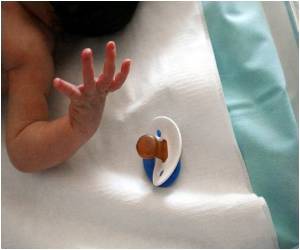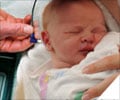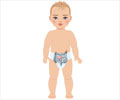For parents, bathing a tiny newborn can be an exciting experience, but it can also be intimidating. Newborns are small and vulnerable, slippery when wet.

Pediatric dermatologist Dawn Davis, M.D., of Mayo Clinic Children's Center and colleagues recently published a review article in the International Journal of Dermatology about newborn skin care. Dr. Davis suggests several tips for keeping a newborn's skin clean and healthy, and making bath time an enjoyable experience:
- Newborns will be ready for their first bath once their body temperature and cardiorespiratory status have stabilized, which is about six hours after birth. A daily bath for a newborn is not recommended, so limiting baths to every other day is sufficient for keeping their skin clean. On the days the newborn is not bathed, it's safe to gently wipe the face and skin with a damp washcloth, and it is recommended to wipe the exterior of each eyelid from the inside to the outside corner.
- Immersing a newborn's entire body into a tub of water, excluding the head and neck, is preferred, as it helps them retain their heat while being bathed. Make sure to support the baby while immersed and only a few inches of warm water is necessary for the bath. To prevent scalding, the thermostat on the water heater should be set below 120 degrees Fahrenheit.
- Simply washing newborns with plain water is adequate; newborn skin is susceptible to infection and irritation. If parents choose to use products, they should select mild, neutral-pH cleansers without dyes or fragrances. Products should be used sparingly and rinsed off completely.
- Diapers should be changed every two to four hours or after a baby has soiled. Cleansing this area with only tap water and a soft cloth is recommended. If baby wipes are the only option, a hypoallergenic wipe without lanolin or alcohol will be less irritating to the skin. Periodically air-drying the area will give the skin a rest from moisture.
- If a newborn gets a diaper rash, Dr. Davis suggests using zinc oxide, a paste with a neutral pH that acts as a barrier between the acidic products of urine and stool and the baby's skin. If the zinc oxide doesn't clear up the rash, she recommends the newborn be seen by a health care provider.
Source-Eurekalert









